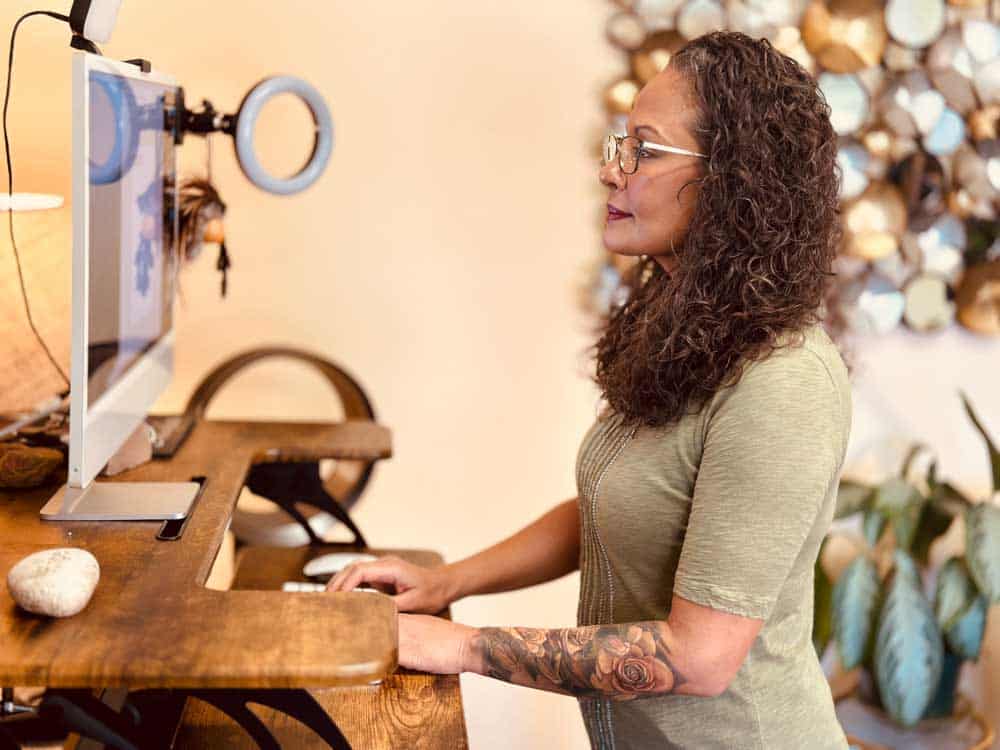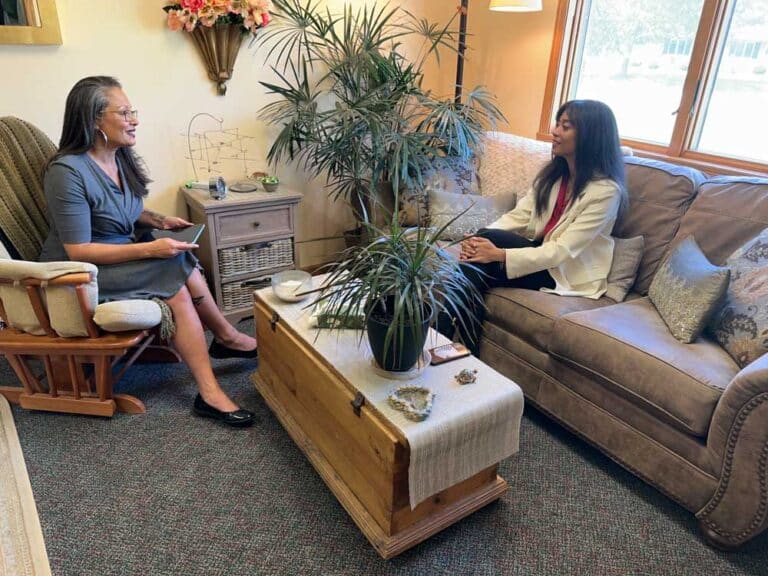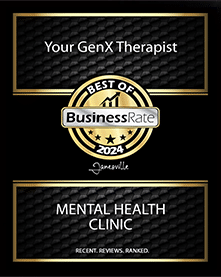Finding the right therapist for anxiety therapy or trauma therapy is a lot like dating—you need someone who gets you, who can handle your quirks, and who makes you feel safe enough to bare your soul.
It’s not just about picking a name out of a hat or going with the first Google search result. Nope, finding the right therapist is about finding someone who speaks your language, understands your needs, and aligns with your personal growth goals. So, let’s dig in and talk about how to find the right fit, because when it comes to your mental health, settling just isn’t an option.
1. Understand What You’re Looking For
Before you even start looking for a therapist, it can be super helpful to have a sense of what you’re hoping to get out of therapy. Are you dealing with anxiety, depression, or trauma? Are you looking to improve your relationships, break old patterns, or just find a better way to cope with daily stress? Knowing your “why” will help you figure out the “who.”
Giving some thought to the kind of therapy you might vibe with will also help you hone in on a psychotherapist who could be a good fit. There are dozens of modalities out there, from Cognitive Behavioral Therapy (CBT) to Emotionally Focused Therapy (EFT), and each one has its unique approach. Maybe you’re drawn to a more structured approach where you’ll get homework and tangible tools to use outside of sessions. Or perhaps you want a more experiential style where encounters in session can be transformative.
If you’re not sure which type of therapy is best for you, that’s completely okay! A skilled therapist can help guide you toward the most effective approach for you. And, if they can’t? Well, that there’s a big ole caution flag you may want to take note of as it could indicate lack of skill and/or depth.
The bottom line here, though, is having a general idea of what you’re looking for can narrow down your search and make it easier to find someone who specializes in the right areas for you.

2. Check Credentials, But Don’t Get Hung Up on Them
Alright, let’s talk credentials. You definitely want a therapist who’s properly trained and licensed, but don’t get too hung up on the alphabet soup after their name. Whether they’re an LPC, LMFT, LCSW, PsyD, or something else, what really matters is their experience and approach. Sure, the degree on the wall is important, but it’s not the be-all and end-all.
Instead of focusing solely on credentials, ask yourself if the therapist’s training aligns with your needs. For example, If you’re dealing with trauma, you’ll want someone who has experience and training specifically in trauma therapy. If you’re navigating relationship issues, a therapist who specializes in couples or family therapy could be a better fit.
A good therapist will also have ongoing training and be up-to-date on the latest research and best practices in their field. So, don’t be afraid to ask about their experience, specialties, and what modalities they use.
3. Find Someone Who Feels Like They REALLY FUCKING Get You
Therapy is a deeply personal process, and you’re going to be sharing some of the most intimate details about your life. You need to find someone who feels like “your people.” Maybe you’re looking for burnout therapy or anxiety therapy, find a therapist who specializes in your unique needs.
Maybe you want someone who shares a similar background or life experience, or maybe you’re looking for someone who’s a bit older Or perhaps you feel more at ease with someone who has a no-nonsense, direct approach rather than a softer, more nurturing style. There’s no right or wrong answer here—prioritize what feels right for you.
And remember, us therapists are human, too. We have different personalities, styles, and approaches. Some therapists are more laid-back and conversational, while others might be more structured and formal. Think about what type of personality would complement yours and help you feel safe to open up.
4. Be Sure to Assess Your Options
Think of finding the right therapist like buying a new car—you wouldn’t just drive off the lot with the first one you see, right? You’d test drive a few, check under the hood, and make sure it’s the right fit for you. The same goes for therapy.
It’s perfectly okay—I encourage you, even—to “shop around” for a therapist. Most therapists offer a free or low-cost initial consultation, either in person or over the phone. Use this time to get a feel for their style, ask about their experience, and see if you feel a connection. Trust your gut. If something feels off, it probably is. And if you feel like you’re being rushed or pressured into scheduling a session, that’s a red flag.
Remember, you’re hiring them to help you, so don’t be afraid to ask questions. What’s their experience with your specific issues? What’s their approach to therapy? How do they handle situations where you might not feel like you’re making progress? Their answers—and how they make you feel—will tell you a lot about whether they’re the right fit for you.
5. Consider the Logistics
Therapy is an investment of both time and money, so it’s important to consider the logistics. Are their office hours compatible with your schedule? Is their office location convenient, or do they offer virtual sessions that fit your needs better?
Also, consider the financial aspect. Will you self-pay or do you want a therapist for anxiety therapy or trauma therapy who’s a provider for your insurance? Be sure to know what the cost is per session, what the cancellation policies are, and any other fees you might need to know about.
And don’t forget about the emotional logistics. Think about how often you want to meet and what kind of commitment you’re willing to make. Therapy isn’t a one-and-done deal—it takes time and effort. Make sure you’re ready for the journey, and find a therapist who aligns with your goals and availability.
6. Trust Your Gut (But Also Give It Time)
When it comes to finding the right therapist, trust your gut. If you meet with someone and immediately feel at ease, that’s a great sign. But if something feels off—maybe you feel judged, or maybe you just don’t click—it’s a-okay to move on!
That said, it’s also important to give it time. The first session (or even the first few sessions) can feel a bit awkward. You’re getting to know each other, and that takes time. Apply discernment about if you feel uncomfortable because you’re doing something unfamiliar or if the therapist themselves has some personality quirk or way of working that is off-putting to you; sometimes, you know right off the bat if someone’s not for you and sometimes, it takes a few sessions to really get into a groove and start feeling comfortable.
But if you’ve been seeing someone for a while, say 4-6 sessions, and you still don’t feel like it’s the right fit, please look for someone else. Therapy is a personal journey, and finding the right therapist is key to making the most of it. Don’t settle for anything less than a therapist who makes you feel safe, supported, and understood.
7. Red Flags to Watch Out For
Just like in dating, there are some red flags to watch out for when choosing a therapist. If a therapist talks more about themselves than you, makes you feel judged or criticized, or pushes their own agenda or beliefs, those are signs to kick that therapist to the curb. Your therapy sessions should be a safe space where you feel heard, not a soapbox for your therapist’s issues or opinions.
Another red flag is a lack of boundaries. A good therapist will maintain professional boundaries and won’t engage in any behavior that feels too personal or inappropriate. If a therapist crosses those boundaries, it’s a sign that they’re not the right fit for you. (And probably not anybody, tbh. God, I hate that there are shitty therapists out there!!!)
And finally, trust your instincts. If something feels off, or if you’re not getting what you need from your sessions, it’s okay to end the relationship and find someone else. Remember, therapy is about *you* and your healing journey. Don’t settle for anything less than a therapist who respects that.
8. Take Your Time, But Don’t Wait Too Long
Finding the right therapist is important, and it’s worth taking the time to find someone who’s the right fit for you. But don’t let the search process hold you back from getting the help you need. If you’re struggling and need support, don’t put it off because you’re waiting for the “perfect” therapist. Sometimes, starting somewhere is better than not starting at all.
If you’re feeling overwhelmed, remember that you don’t have to navigate this process alone. There are resources available to help you find a therapist, from online directories to recommendations from friends or healthcare providers. And once you find someone, give it a fair shot. Therapy takes time, and the right therapist can make all the difference in your healing journey.
9. The Bottom Line: You Deserve a Therapist Who Gets You
At the end of the day, finding the right therapist is about finding someone who truly *gets* you. Someone who listens without judgment, who challenges you when needed, and who supports you in healing and becoming the best version of yourself.
So, take your time, trust your instincts, and don’t settle for anything less than what you deserve, which, come on, is THE BEST! Your mental health is too important to leave to chance. You deserve a therapist who’s not just good—but who’s *right* for you.
Ready to find your therapist match? Take the first step today. Whether you’re looking for in-person sessions or want the flexibility of video therapy, finding the right therapist can be a game-changer in your journey to better mental health. Don’t wait—start your search today and find the support you deserve.
If you are a GenX’er in Wisconsin or Texas, I’m here to help! Book a consultation today and see how I can provide the professional support you deserve to overcome life’s challenges and improve your mental health.

















